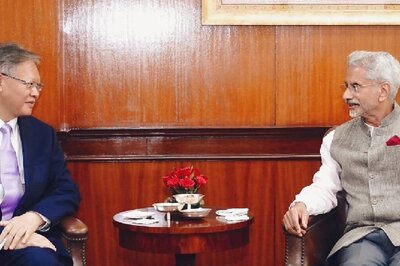
views
New Delhi: The Reserve Bank of India raised interest rates on Friday for the 12th time in 18 months and said it would persist with its anti-inflationary policy stance, even as growth slows in Asia's third-largest economy.
The Reserve Bank of India lifted its policy lending rate, called the repo rate , by 25 basis points to 8.25 percent, in line with expectations, as it persisted in a fight with inflation that has proven mostly futile.
Headline inflation for August rose to 9.78 percent, its highest level in more than a year, data showed on Wednesday.
Commentary:
Shakti Satapathy, Economist, AK Capital, Mumbai:
"As expected the rate hike is in line with the pre-policy expectation of 25 bps. The tone of central bank indicates the anti-inflationary stance will remain as priority; change in the current stance will depend on the downward movement in the inflationary curve going forward.
"However, with cumulative impact of earlier rate hikes yet to take place in the later part of the fiscal year, the probability of further rate hikes seems minimal."
BACKGROUND:
- State-run oil refiners raised petrol prices by nearly 5 percent from Friday, a move that eases their subsidy burden but adds near-term pressure to stubbornly high inflation in Asia's third-largest economy.
- Annual inflation climbed to its highest in more than a year in August as prices of food and manufactured goods surged. The wholesale price index rose 9.78 percent, higher than the median forecast of 9.6 percent.
- Food price index rose 9.47 percent and the fuel price index climbed 13.01 per cent in the year to September 3, government data on Thursday showed.
- Industrial output growth slumped to 3.3 percent in July, its weakest annual pace in nearly two years.
- Factory sector expanded at its slowest pace in more than two years in August as export orders shrank amid weakening global demand, a survey of manufacturers in Asia's third-largest economy showed.
- Services sector grew at its slowest pace in more than two years in August, throttled by feeble expansion in new business as a faltering global economy and tight domestic monetary conditions weighed, a survey showed early this month.




















Comments
0 comment